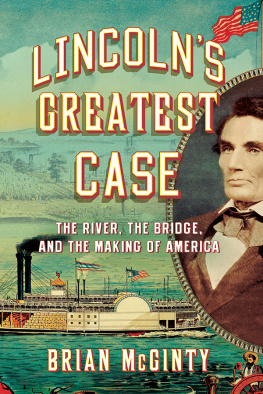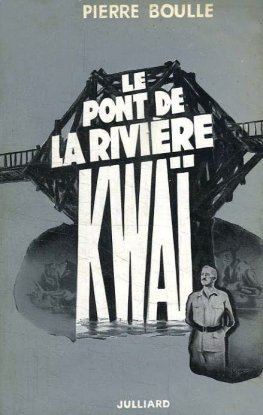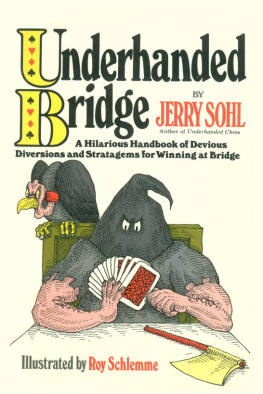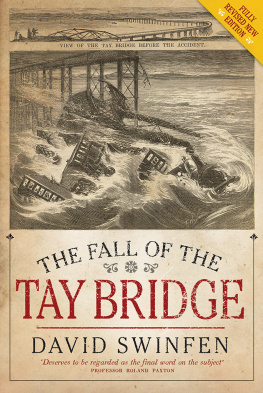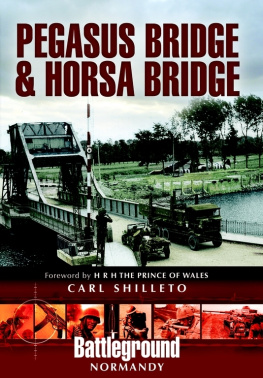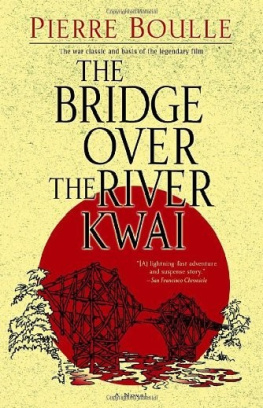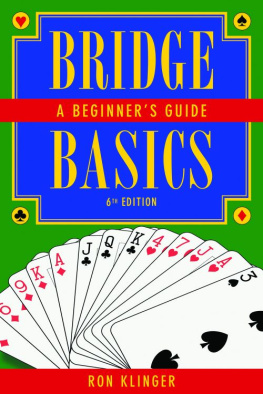
Copyright 2015 by Brian McGinty
All rights reserved
First published as a Liveright paperback 2016
For information about permission to reproduce selections from this book, write to Permissions, Liveright Publishing Corporation, a division of W. W. Norton & Company, Inc.,
500 Fifth Avenue, New York, NY 10110
For information about special discounts for bulk purchases, please contact
W. W. Norton Special Sales at specialsales@wwnorton.com or 800-233-4830
Book design by Brooke Koven
Production manager: Anna Oler
The Library of Congress has cataloged the printed edition as follows:
McGinty, Brian, author.
Lincolns greatest case : the river, the bridge, and the making of America / Brian McGinty.
pages cm
Includes bibliographical references and index.
ISBN 978-0-87140-784-9 (hardcover)
1. Hurd, John, (steamboat owner) 2. TrialsIllinoisChicago. 3. Effie Afton (Steamboat) 4. Rock Island Railroad Company. 5. ShipwrecksLaw and legislationUnited States. 6. Railroad bridgesUnited States. 7. Liability for railroad accidentsUnited States. 8. Lincoln, Abraham, 18091865. I. Title.
KF223.H856M34 2015
346.7303'22dc23
2014036938
ISBN 978-0-87140-785-6 (e-book)
ISBN 978-1-63149-147-4 (pbk.)
Liveright Publishing Corporation
500 Fifth Avenue, New York, N.Y. 10110
www.wwnorton.com
W. W. Norton & Company Ltd.
Castle House, 75/76 Wells Street, London W1T 3QT
PRAISE FOR
LINCOLNS GREATEST CASE
A fascinating study of the case that capped Lincolns career as a lawyer and fostered the creation of the vast railroad network that would bind the nation together.
Richard Slotkin, author of The Long Road to Antietam
Brian McGintys riveting account of the Effie Afton trial of 1857 not only highlights the role of Abraham Lincoln in assuring the superiority of railroad transport over river navigation in the nations development but also how the case gave a boost to Lincolns career both as a lawyer and as a political leader.
James M. McPherson, author of Embattled Rebel: Jefferson Davis as Commander in Chief
Accomplished legal historian Brian McGinty has provided the definitive account of a crucial episode in Abraham Lincolns career as an attorney: the precedent-setting Effie Afton case. McGinty deftly explains the judicial and political implications of this effort by Lincoln to establish the inevitability (and desirability) of economic development in the West, and does so through superior research, fine reasoning, and lucid prose. Effie Afton was much more than an ordinary legal caseand this book is much more than a mere account of a preCivil War trial. Anyone seeking to better understand the origins of the growing tensions between political parties in mid-nineteenth-century America will find this book absolutely essential.
Harold Holzer, Roger Hertog Fellow, New-York Historical Society
Of the 5,000-plus cases in which attorney Abraham Lincoln participated, none had more national significance than the one that Brian McGinty so ably describes and analyzes in this highly readable volume. Based on thorough research, McGinty not only sheds bright light on Lincolns contribution to the defense of the bridge company but also places the story within the larger context of American economic, social, and military history.
Michael Burlingame, author of Abraham Lincoln: A Life
As Brian McGinty demonstrates so well in his latest book, Lincoln showed great political courage as an attorney when he was called upon to defend progress in 1857. While Lincoln successfully defended the Rock Island Railroad from claims of the owners of the river boat Effie Afton , he was also a successful mediator, recognizing the importance of both modes of transportation.
Frank J. Williams, founding chairman of the Lincoln Forum
To the memory of my grandfather
Lucius Frank McGinty Jr.,
a Southerner who revered Lincoln, and encouraged
my earliest efforts at writing
ALSO BY BRIAN MCGINTY
Lincoln and the Court
John Browns Trial
The Body of John Merryman: Abraham Lincoln and the Suspension of Habeas Corpus
Strong Wine: The Life and Legend of Agoston Haraszthy
The Oatman Massacre: A Tale of Desert Captivity and Survival
Paderewski at Paso Robles: A Great Pianists Home Away from Home in California
A Toast to Eclipse: Arpad Haraszthy and the Sparkling Wine of Old San Francisco
The Palace Inns: A Connoisseurs Guide to Historic American Hotels
Haraszthy at the Mint
(Famous California Trials Series)
We the People: A Special Issue of American History Illustrated Commemorating the Two-Hundredth Anniversary of the U.S. Constitution
O n September 8, 1857, a tall and eerily thin lawyer from the prairies of central Illinois rose in the crowded courtroom of the United States Circuit Court in Chicago to address the judge and jury. Abraham Lincoln, already a well-known courtroom attorney in the lakeside city, had come north from his home in downstate Springfield because of an incident that occurred in the spring of the previous year on the Mississippi River between Rock Island, Illinois, and Davenport, Iowa. On May 6, 1856, a steamboat known as the Effie Afton had crashed into the first railroad bridge ever built across the Mississippi River, erupted in flames, and sunk in the river waters. No one was killed in the crash, but the steamboat was a total loss, and the bridge itselfcalled the Rock Island Bridgewas badly damaged. The owners of the steamboat had filed suit against the owners of the bridge to recover damages sustained in the collision. Lincoln had been retained as one of the lawyers for the defense of the suit, and the trial was now about to begin.
Officially titled Hurd et al. v. The Railroad Bridge Company,
This book tells the story of the Effie Afton case, the dramatic series of events that led up to it, Lincolns key role in it, and the equally dramatic events that followed. It traces the history of steamboat traffic on the Mississippi in the first half of the nineteenth century, follows the progress of railroads west of the Appalachians in the middle of the century, and describes the epochal clash of the railroads and the steamboats at the rivers edge. It explains how the Rock Island Bridge carried the first iron rails across the great river and details the determined efforts of the steamboat owners and their supporters to bring it down. It tells how the Effie Afton trial and Lincolns participation in it saved the bridge from destruction, how the trial contributed to Lincolns meteoric rise to the presidency only four years later, and how the bridge helped Union military forces achieve victory over Confederate armies in the Civil War.
Lincoln had a close relationship with the western rivers and riverboats when he was a young man, and as an adult he was never far from the railroads, which came into Illinois as he was beginning his legal and political careers. He was a river man in his early years, and a railroad attorney of sorts in his middle years (he never worked exclusively for railroads, but took cases both for them and against them). The river and the railroads form an indispensable background to the story of the Rock Island Bridge, the Effie Aftons demise at its base in 1856, and Lincolns career as a lawyer and politician, both before and after the Effie Afton trial.
Given its importance, it is curious that historians have not focused more attention on the trial and its place in the transportation history of the nation. It has, of course, been mentioned in almost every serious book and article about Lincolns legal career, sometimes as a mere footnote to the main narrative, more often as the subject of a few paragraphs outlining its contours. And, in recent years, more and more light has been focused on Lincolns life as a lawyer and the influence it had on his political life and his ultimate service as president, thanks in large part to the momentous Lincoln Legal Papers project, which has uncovered tens of thousands of documents from his law practice.
Next page
